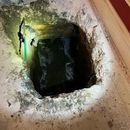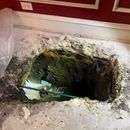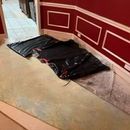Is Rebar Needed in Post-Tension, Slab-on-Grade Repair?
After a foundation leveling, a sub-slab leak was detected. A plumbing company specializing in sub-slab leaks found and repaired a leak in a supply line. The plumber used a subcontractor to cut the slab, excavate the soil, and will replace the soil and patch the slab sometime this week.
The plumber said the sub will determine the rebar size and placement based on the size of the hole in the slab, approximately two feet by three feet. The plumber said the sub would probably use #4 rebar. The sub said no rebar was needed because the slab is post-tension and one of the post-tension cables is exposed in the hole. The inspector said you’ll probably want some #6 rebar. The inspector wouldn’t give any further information about rebar size or placement. When pressed further, the inspector suggested hiring an engineer, but also said an engineer wasn’t necessary for a small project like this.
Three professionals, three opinions. Who’s right? (or most right)
Thanks in advance for you help. I have learned a lot from this community over the years. I can also provide additional information or a few more picture if that would help.
Kel, a carpenter in North Texas
The house is a 3500 SqFt, two-story, single family home, built in 1999, Dallas/Forth Worth, climate zone 3A, warm/humid.
GBA Detail Library
A collection of one thousand construction details organized by climate and house part












Replies
Kel,
The area of the repair is certainly non-structural, or load bearing. After recompacting the soil, I wouldn’t say that rebar is strictly necessary here, but, it would ease my mind knowing that if the ground settled a little, that the patch wouldn’t just sink a fraction or two of an inch. Maybe buy one 10’ stick and cut it up just to say it’s there?
Kel,
The two people who have skin in this are the inspector, and your contractor.
Inspectors options are to say either what you propose doesn't meet code, or to ask for an engineer's approval. They should never size structural components. So if they say an engineer is not necessary, that's all the useful information you can expect from them.
If your contractor is comfortable deciding how best to patch the hole, then it's on him. He is taking on the liability.
Thanks for your help Bentley. The soil is highly expansive and about 25-30 cubic feet of soil came out of the hole. I’d be concerned about improper compaction and setting.
I agree 100% with Malcolm.
Now, you have a decision to make
Options #1 - no rebar per contractor
Option# #2 - plumber suggested #4 rebar
Option #3 ~ inspector suggest #6 rebar.
Option #4 - Find an engineer for this tiny job (good luck in economy)
Rebar for that size hole is not expensive. Cutting and placing it would take 1 to 2 hours I expect.
Using #6 rebar instead of #4 will have little impact on cost.
If you are risk averse, you tell the contractor that the inspector “said” #6 rebar and just pay a little more to have it installed.
If you feel confident in the explanation from the contractor (who is not an engineer), you can follow their advice and save a few bucks.
If it was my slab, I would pay a bit extra and put the #6 rebar. The inspector will be happy and you will not need to wonder in the next days/weeks/months whether you “should have” done it.
There an old saying, we regret the things we don’t do than the things we do.
If it helps, my slab has rebar 12” o/c. The engineer required 10” o/c where ever there was a post to support a beam (we don’t have many posts)